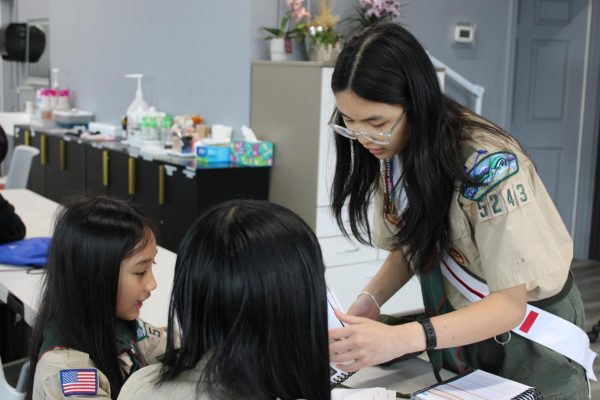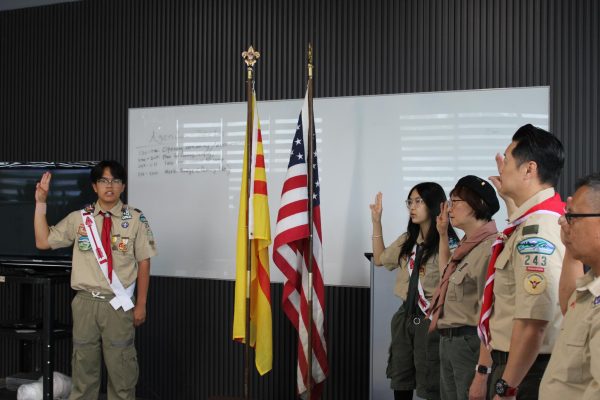A three-fingered salute and the words, “To help other people at all times; to keep myself physically strong, mentally awake, and morally straight,” are all too familiar for Grant High School senior Vy Tran. The salute and words belong to the Scout Oath, a pledge of allegiance of sorts for members of Scouting America (SA), an organization that Tran has devoted herself to for the last five years.
“I have a really bad life-Scouts balance,” says Tran sheepishly. “It’s like 85% of my life is in Scouts and (I) split that other 15% between school and personal. It’s really bad.”
Yet Tran says, “You really put in what you take out,” regarding her time in Scouts. Her dedication has provided her with a tight-knit community and the opportunity to embark on outdoor adventures and community service projects that push her beyond her comfort zone.
“The way I fell into Scouting was sort of just finding my space somewhere that I would have never expected to find it,” she says.
This sense of belonging came as a surprise to Tran after joining an all-Vietnamese troop as a female scout. She hadn’t expected to find such a strong sense of community in Scouts — an organization that is more than 70 percent white and has historically excluded girls and gender-nonconforming people.
Tran was initially a Girl Scout until 2019 — when Boy Scouts of America (BSA) made a drastic change that opened up a door for Tran and her seven-member Girl Scouts troop. Upending a status quo of over 100 years, BSA changed its name to SA, referred to as “Scouts” by members, and began officially accepting members of all gender identities and sexualities.
Emerging from bankruptcy after paying over two billion dollars in damages to the roughly 82,000 men who had been sexually abused during their time in BSA, the shift came at a crucial time for the organization. SA’s drive for inclusion sought to increase membership — and concurrently the revenue gained from membership and activities fees — by widening its pool of eligible scouts.
After the announcement, Tran’s Girl Scouts troop leader urged them to join SA for better opportunities and more hands-on activities. “That’s when me and my small troop of seven other girls ended up all becoming Boy Scouts,” she says.
While both organizations strive to shape children into community-minded, upstanding citizens, the transition between the two was not seamless; SA events proved to be much more rigorous than any of Tran’s past Girl Scouts meetings. “I think camping was probably the biggest culture shock going from Girl Scouts to Boy Scouts,” she says. “It just became so much more serious … It was just a bigger community and it was a more immersive community.”

Yet it was also a community that Tran’s Scouts troops have felt distanced from. “Sometimes we feel like we’re a spectacle. These troops have never seen people of other colors or other genders conform together before,” says Tran. “Sometimes I feel like people are watching us more than they should, than what is normal … we’re just all people, you know, but sometimes it doesn’t feel like that.”
When Tran’s initial Scouts troop attended Camp Meriwether for the first time the summer after SA began accepting members of all gender identities, the sense of otherness they felt was pervasive. “My troop, not only are we of the already very few only-girls troops that existed at the time, we were, I think, the first Vietnamese troop in all of Oregon,” says Tran. “There was a big separation between us and the people at camp that have always been going there — like the stereotypical little white boys troops. It’s like, we’re not white, and we’re not little boys, so it was kind of a big gap.”
Furthermore, barriers still exist between female and male troops. SA produces two handbooks that act as a “comprehensive guide to scouting:” the Scouts BSA Handbook for Boys and the Scouts BSA Handbook for Girls. “The only significant difference,” says Tran, “is there’s only boys pictures in the handbook for boys, and there’s only girls pictures in the … handbook for girls. It’s the same concept.”
Non-boys troops like Tran’s are also placed at a significant disadvantage when finding Scoutmasters — adults, ideally former Scouts, who undergo training to lead and advise SA troops. Adult males make up a majority of Scoutmasters because they were the only demographic eligible for SA prior to 2019. The scarcity of former female scouts left many girls’ troops feeling stranded without guidance as there were few women who could act as Scoutmasters for their troops. “I think that’s one of the reasons why it was a lot harder for girls troops to have startups than boys troops because (with) boys troops, adult leaders would have already been scouts,” says Tran.
These barriers have done little to deter Tran from making the most out of her time in Scouts. After joining the newly founded Troop 243, the second all-Vietnamese troop in Oregon, Tran was quickly voted Senior Patrol Leader due to the strong set of management and practical skills she had developed through Scouting. In the troop’s highest leadership role she not only participates in all of their troop’s events but leads and plans them as well. In 2023, Tran was also nominated and inducted into the Order of the Arrow, a nationwide honors society for accomplished Scouts who “best exemplify the Scout Oath and Law in their daily lives.”
Being in Scouts has taught Tran how to develop the inner strength needed to advocate for herself. “I think Scouts, over time, just built up my confidence,” says Tran. “If you want something, take that first step. If you feel like you need something, take that first step. Don’t wait for someone to offer you something to you, find yourself an offer.”
Reflecting on the experiences of her peers, Tran says, “I find that Scouts is a safe space for a lot of people.” Personally, Scouts has become a comforting way for Tran to escape the stress of life. “If school gets too hard or home gets too hard I can go to Scouts,” she says.

Tran, along with the rest of troop 243, would like to build overall diversity within SA in order to help scouts of all backgrounds feel welcome and safe within the organization too. “We’re a part of the whole Council’s (referring to SA’s Cascade Pacific troops) diversity because we are Asian people in a predominantly white space. But the troop itself — if it’s only Vietnamese people — it’s not really diverse,” says Tran. They are striving to provide a community for Scouts from “different races, different genders — just as many people as possible,” so that youth across Portland can feel the same sense of belonging that the members of Troop 243 have discovered. “That’s the goals of 243, they’re trying to be directly more diverse.”
Tran returned to Camp Meriwether this summer for eight weeks to work as a camp counselor with Troop 243’s mission in mind. “I’m going to begin helping the staff diversity because I don’t see a lot of females and Asian people in Boy Scout staffing in general,” she says. As a nontraditional scout, Tran hopes her background can help make younger scouts feel welcomed and seen at camp. “You want people around you who are leading you and guiding you to be like you or (to) be similar to you — just so you feel safer.”




































